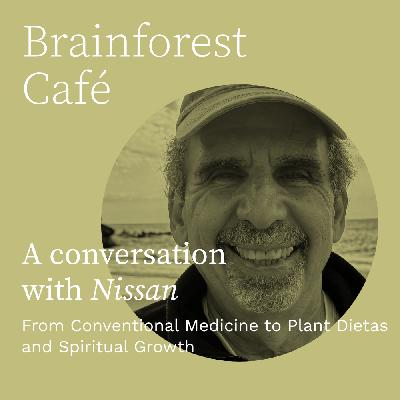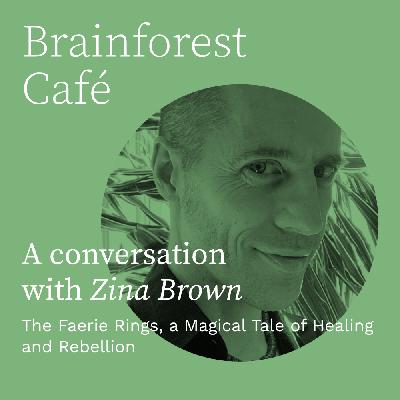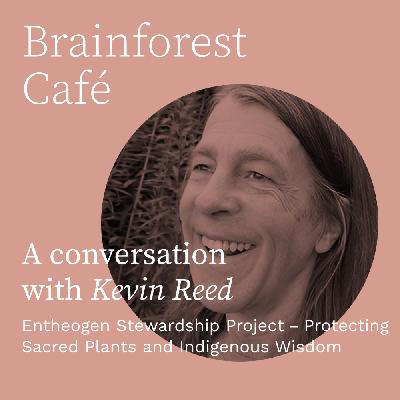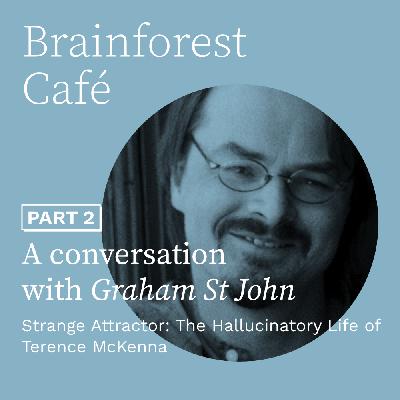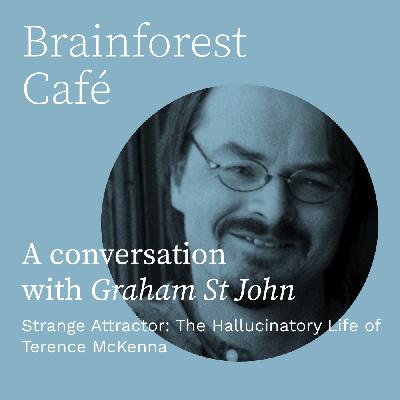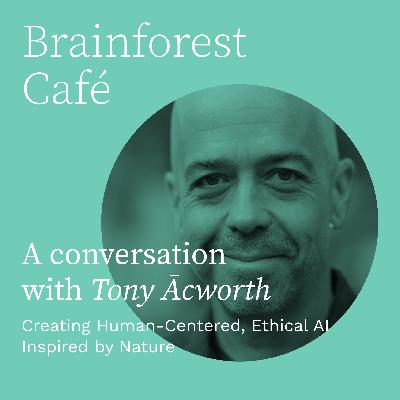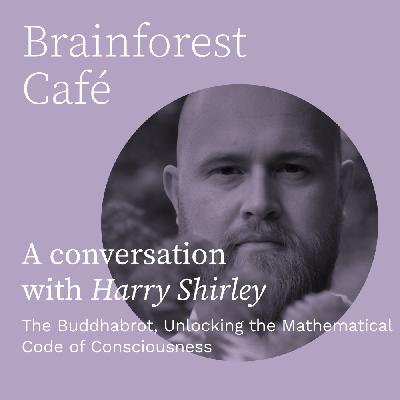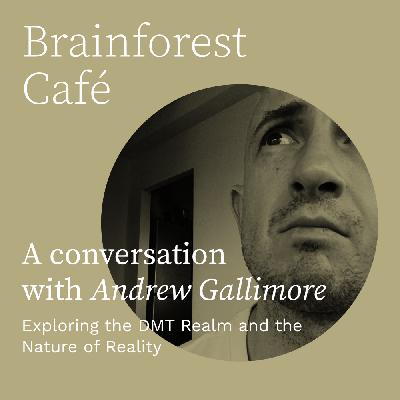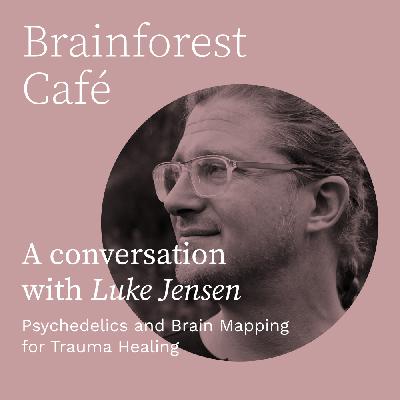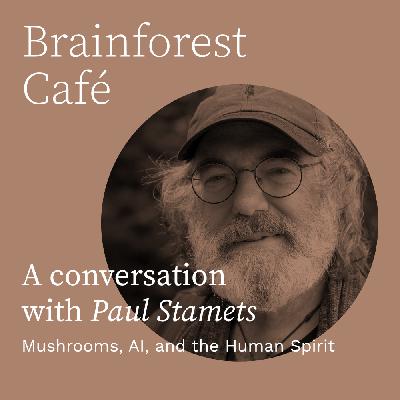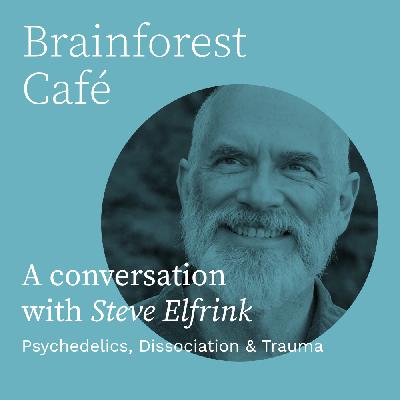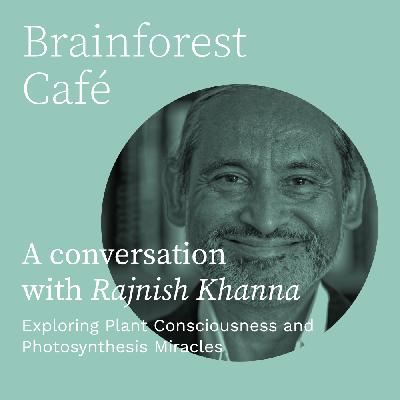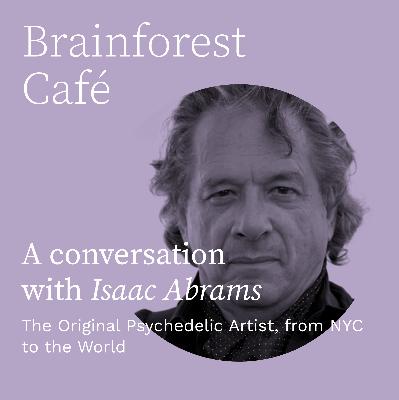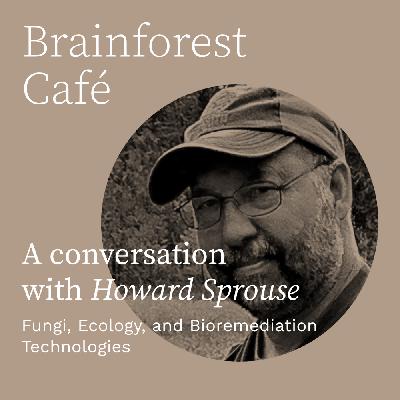Discover Brainforest Café
Brainforest Café

Brainforest Café
Author: McKenna Academy of Natural Philosophy
Subscribed: 37Played: 703Subscribe
Share
© 2025 McKenna Academy of Natural Philosophy
Description
In the Brainforest Café, Dennis McKenna discusses a wide range of topics related to philosophy, plant medicines, psychedelics and consciousness in nature. Guests are invited from diverse fields such as anthropology, neuroscience, and spirituality to explore various aspects of the human experience.
Some of the topics that are covered in the Brainforest Café include the history and the role of plant medicines in traditional healing practices and the potential benefits of psychedelic-assisted therapy for mental health. The Brainforest Café also explores the cultural, social, and political implications of psychedelic use.
Dennis McKenna shares his own personal experiences with plant medicines, offering insights and reflections on his own journey of self-discovery and transformation. The Brainforest Café is a thought-provoking and engaging exploration of the intersection between science, spirituality, and culture, and offers a valuable perspective on the potential of plant medicines to transform our understanding of ourselves and the natural world.
Some of the topics that are covered in the Brainforest Café include the history and the role of plant medicines in traditional healing practices and the potential benefits of psychedelic-assisted therapy for mental health. The Brainforest Café also explores the cultural, social, and political implications of psychedelic use.
Dennis McKenna shares his own personal experiences with plant medicines, offering insights and reflections on his own journey of self-discovery and transformation. The Brainforest Café is a thought-provoking and engaging exploration of the intersection between science, spirituality, and culture, and offers a valuable perspective on the potential of plant medicines to transform our understanding of ourselves and the natural world.
48 Episodes
Reverse
Nissan started his career as a medical doctor and began his work as a general practitioner in an urban community clinic system. He then specialized in ophthalmology and practiced in a small town for 36 years. He became dissatisfied working strictly on the physical level and received training in Gestalt psychotherapy and had a small private practice. He became interested in the field of Natural Vision Improvement which combined his interest in vision with present moment, embodied presence. A reading from a tarot card reading psychic suggested the need for working in and with the spiritual realm to facilitate the Natural Vision work and suggested there were some gifts for him in shamanism. His wife had had a powerful experience in a ceremony with Don José Campos and encouraged him to explore Ayahuasca as a method to open himself spiritually. He had two very different , but powerful experiences with Don José and participated in a plant dieta in the Amazon in 2005 with Don José. He received what he interpreted as an initiatory experience and felt called to be trained as a vegetalista. He embarked on the training under Don José and Don Lucho’s guidance and began leading ceremonies in the US in 2009 and in 2011 began leading plant dietas in the Amazon. He continues to lead ceremonies in various locations in the US and occasionally Canada and leads dietas in the Amazon twice a year.
Zina Brown is the writer and director of The Faerie Rings, an upcoming narrative feature filmabout the promise of visionary plant medicines, and the cruelty of those who would outlawthem.Zina’s unique visual and narrative style has been awarded in film festivals across the world,including the Barcelona International Environmental Film Festival, Kyiv Film Festival inUkraine, Mexico City International Film Festival, Amsterdam International Film Festival, SanAntonio Film Festival, and the Woods Hole Film Festival.He has over 25 years of writing and directing experience, including numerous music videosand festival favorite short films. His short film, Dreams of the Last Butterflies, was screenedat 50 Film Festivals in 13 countries, as well as winning many awards.
Kevin Reed, founder and president of the Entheogen Stewardship Project, a vital new nonprofit organization dedicated to protecting culturally significant plant and animal species sacred to indigenous communities worldwide.Kevin brings a remarkable 45-year journey as a student of psychedelic science and culture to this crucial conservation work. His path began in 1984 under the mentorship of legendary researchers Sasha and Anne Shulgin, followed by profound connections with iconic figures including Wavy Gravy, Jack Herer, Timothy Leary, Rick Strassman, and many others who have shaped the modern psychedelic renaissance.Kevin's hands-on expertise spans an impressive range of fields: from teaching cannabis extraction in the mountains of Jamaica in 1985, to large-scale indoor cultivation in the Netherlands, to designing and successfully opening a state-of-the-art Type 7 cannabis manufacturing facility in California. His diverse interests encompass mycology, conservation biology, indigenous traditions, accelerated learning, transpersonal psychology, and ethical wildcrafting—principles that now support his conservation philosophy.The Entheogen Stewardship Project represents the culmination of Kevin's decades-long commitment to both psychedelic wisdom, indigenous rights and environmental protection. The organization combats illegal trafficking and exploitation of endangered entheogenic species while fostering respectful collaboration with all indigenous communities whose ancestral knowledge have safeguarded these sacred plant and animal spirits for millennia.Kevin's work addresses one of the most pressing issues facing our community today: how do we honor and protect the plant and animal teachers that have guided human consciousness for thousands of years, while ensuring their survival for future generations?
Chapters
(00:00:13) - Kevin Reed(00:02:44) - Kevin Reed on Cannabis Ethics(00:12:32) - Psilocybin and the Bardo(00:20:46) - The Ethnobotanical Stewardship(00:26:01) - The Psychedelic Science Foundation's work in Brazil(00:32:37) - The journey of ayahuasca in the Amazon(00:44:56) - The role of plant medicines in intelligence stewardship
Graham St John, PhD, is a cultural anthropologist and historian of transformational events, movements, and figures. His forthcoming book Strange Attractor: The Hallucinatory Life of Terence McKenna (MIT Press, Oct 7, 2025) is the latest among his ten books, which also include Mystery School in Hyperspace: A Cultural History of DMT (North Atlantic Books 2015). Graham is Senior Research Fellow in the Department of Media, Humanities and the Arts at the University of Huddersfield, UK.
Graham St John, PhD, is a cultural anthropologist and historian of transformational events, movements, and figures. His forthcoming book Strange Attractor: The Hallucinatory Life of Terence McKenna (MIT Press, Sep 30, 2025) is the latest among his ten books, which also include Mystery School in Hyperspace: A Cultural History of DMT (North Atlantic Books 2015). Graham is Senior Research Fellow in the Department of Media, Humanities and the Arts at the University of Huddersfield, UK.
Chapters
(00:00:13) - Introduction(00:01:38) - Early McKenna Brothers’ History(00:06:38) - Terence’s Rejection of Science & Authority(00:09:49) - Timewave Zero Theory(00:18:10) - Limitations & Criticism of Timewave Zero(00:22:35) - Compressionism & Acceleration of History(00:25:59) - Possible Modern ‘Transcendental Object’—AI(00:28:27) - Terence’s Oratory Legacy & Cultural Impact(00:33:01) - AI Simulations of Terence’s Voice(00:40:12) - Research Process & Acknowledgements(00:41:36) - Rick Watson & Early Psychedelic Experiments(00:46:49) - John Parker’s Influence(00:49:03) - Unusual Characters from Paonia(00:52:25) - Telegraph Avenue ‘Salon’(00:55:31) - Neo Etudiant Newsletter(00:59:54) - Morning Glory Seeds & Hawaiian Wood Rose as Psychedelics(01:03:59) - Need for Further Research(01:05:03) - Writing the Biography During COVID(01:06:26) - Closing Remarks
Tony Ācworth (pronounced Ayk-worth) is a visionary herbalist, psychedelic advocate, forest guide, and self-described “wily wizard” living with his wife and five-year-old son amid the coastal rainforests of Brentwood Bay, Vancouver Island.
For 15 plus years, Tony has walked the plant (and mushroom) path, logged over 5,000 clinical hours doing comprehensive intakes with patients, helping them untangle what truly plagues the mind, body, and spirit. Under the mentorship of herbal elder and prolific author and mycologist Robert Rogers, Tony deepened his reverence for the fungal world and its wisdom.
In 2015, he was hired to work in Pacific Rim College’s herbal dispensary. Soon after he created and began teaching their first medicinal mushroom materia medica. From here, Tony began offering herbal clinics, nutrition courses, herbal therapeutics and mycological exploration weekends for students in the community herbalist, nutrition, and permaculture programs at the College. At home, he spent a decade developing his own ritual for psilocybin ceremonies, immersing himself in shamanism from Iquitos to the moss-laden forests of Vancouver Island.This led to guiding individuals and men’s groups through the ritual experience, facilitating deeppersonal explorations for those who participated.
Tony is also the creator behind DelOs, his heart-led line of herbal-supported mushroom microdose blends, with the expressed purpose of supporting the human body and nervous system with herbal medicine to help rewire stagnant, disserving patterns and improve overall well-being.
In 2026, he will expand his offerings by launching a dedicated Psychedelic Therapy Training Program at Pacific Rim College, further bridging ancestral plant wisdom with modern integration practice.Recently, Tony blends mushroom intelligence with machines as a mycelial-minded systems tinkerer building ethical, living AI ecosystems designed to help people recalibrate and remember who they truly are. His work guides both personal recalibration and scalable AI solutions for human-centered collaboration, ensuring that advanced technology uplifts humanity.
He’s a father, a leatherworker, a Raspberry Pi hobbyist and if he appears in your life, chances are, the mushrooms arranged it.
Tony Ācworth is a techno-mystic wizard: part forest guide, part quantum gardener, part mycelial ambassador – all heart.
Dr Harry Shirley has a PhD in organic chemistry and research experience at theUniversity of Oxford. His research focussed on the synthesis of biologically active chemicalsof marine origin. Having left academia some years ago, he now holds a deep passion forJungian thought. He recently published his paper “the Buddhabrot and the Unus Mundus” inthe International Journal of Jungian Studies, which explores the role of the Mandelbrot set inmind and matter.
Dr. Andrew Gallimore is a computational neurobiologist, chemical pharmacologist, and writer, living and working in Tokyo. He has a master’s degree in chemical pharmacology and a PhD in biological chemistry from the University of Cambridge and has held postdoctoral research fellowships in computational neuroscience at the Universities of York, Oxford, and Okinawa. He has been fascinated by the neuropharmacology of psychedelics for more than two decades and is the author of three books: Alien Information Theory -- Psychedelic Drug Technologies and the Cosmic Game; Reality Switch Technologies -- Psychedelics as Tools for the Discovery and Exploration of New Worlds.; and the forthcoming Death by Astonishment -- Confronting the Mystery of the World’s Strangest Drug, which focuses on the history of DMT and science’s continuing struggle to understand how such a simple naturally-occurring molecule can have such astonishing effects on the human mind. His current interests lie in implications of DMT in understanding the nature of reality, and how it might be developed as a tool for extended communication with non-human intelligences inaccessible to normal waking consciousness.
Luke served in the Marine Corps for six years and two years in the National Guard, deploying to Afghanistan with an Airborne infantry unit. After his deployment, he faced severe PTSD, a loss of purpose, and a transformative “dark night of the soul.” Seeking healing, Luke explored various modalities, eventually traveling to the Amazon basin in Peru to experience Ayahuasca. This profound encounter brought him personal healing and a spiritual awakening, revealing the vast, interconnected nature of the universe.
Inspired by this experience, Luke delved into shamanism, including rediscovering lost Northern European traditions. Along his spiritual journey, he encountered neurofeedback and QEEG brain mapping, recognizing their transformative potential for healing and spiritual growth—what he calls “spiritual neuroscience” or “electronic yoga.” These tools became central to his evolving vision.
In 2019, Luke met Dr. Richard Soutar, whose mentorship profoundly deepened his understanding of consciousness, healing, and the neurological foundations of spiritual development.
Since December 2023, Luke has been leading retreats in Peru’s Sacred Valley, combining diverse healing modalities into a unique and transformative experience. He has also conducted groundbreaking research using QEEG brain mapping to study plant medicines, including the first longitudinal study on Ayahuasca and the first brain imaging study of Huachuma. Through these studies and future research, Luke hopes to deepen humanity’s understanding of plant medicines, consciousness, and spirituality. His work aims to inspire a greater recognition of our spiritual nature and the boundless potential for personal and collective transformation.
Paul Stamets, speaker, author, mycologist, medical researcher and entrepreneur, is considered an intellectual and industry leader in fungi: habitat, medicinal use, and production. He lectures extensively to deepen the understanding and respect for the organisms that literally exist under every footstep taken on this path of life. His presentations cover a range of mushroom species and research showing how mushrooms can help the health of people and planet. His central premise is that habitats have immune systems, just like people, and mushrooms are cellular bridges between the two. Our close evolutionary relationship to fungi can be the basis for novel pairings in the microbiome that lead to greater sustainability and immune enhancement.
Paul’s philosophy is that “MycoDiversity is BioSecurity.” He sees the ancient Old Growth forests of the Pacific Northwest as a resource of incalculable value, especially in terms of its fungal genome. A dedicated hiker and explorer, his passion is to preserve and protect as many ancestral strains of mushrooms as possible from these pristine woodlands. His research is considered breakthrough by thought leaders for creating a paradigm shift for helping ecosystems survive worldwide.Paul´s most recent book (2025) is called "Psilocybin Mushrooms in Their Natural Habitats".oms in Their Natural Hbin Mushrooms in Their Natural Habitats
Steve Elfrink, a pioneer with over 40 years of experience in psychedelic medicine and integrative healing, is the founder of OmTerra (www.omterra.org). In this podcast, Steve focuses on his groundbreaking hypothesis of Psychedelic Iatrogenic Structural Dissociation (PISD), which was recently published in Frontiers in Psychology (co-authored by Leigh Bergin). Drawing from his own deeply personal journey—from a transformative yet destabilizing ayahuasca ceremony in a sacred Southern Wisconsin valley to years of navigating dissociative trauma—Steve shares how these experiences led him to explore how psychedelics can deconstruct dissociative processes and potentially release trauma too quickly. With his expertise in legal psilocybin facilitation in Oregon and Psycholytic Somatic Integration Therapy (PSIT) using low-dose ketamine for PTSD and C-PTSD, Steve offers unique insights into the importance of cautious, titrated psychedelic sessions and somatic integration. Join him as he recounts his personal story, unpacks the science behind PISD, and discusses the transformative yet sometimes challenging nature of psychedelic therapy.
Rajnish Khanna, M.Sc. Ph.D., is a Senior Investigator, Biosphere Science and Engineering at Carnegie Science, Stanford. Rajnish is the founder and Chief Executive Officer of i-Cultiver, Inc.
TerreLocal, and co-founder and Executive Director of “Urban Green Project”. He is a strategic biotechnology consultant, plant and soil health scientist applying multidisciplinary approaches for research and development.
Known for empowering the industry through strategic partnerships with academic institutions, facilitating technology transfer into real world applications, and deploying advanced technologies such as CLASlite, a unique software to quantify and monitor crop and tree health at global scale for agro-eco projects. Rajnish applies photobiology to explore the science of consciousness. He has developed a unique and testable “Theory of Spatial Relativity” relating to the origins of consciousness, which aligns modern science with ancient concepts of spirituality.
Rajnish is the host of TerreScience podcast/YouTube channel focused on soil and planetary health. For a full bio, visit www.rajnishkhanna.com.
Isaac Abrams was born and raised in New York City.He is a self-taught artist who started painting in 1965.Based in Upstate New York, he continues to paint every day.
He first discovered psychedelics in 1962. He then discovered psychedelics again and again. He decided there had to be such a thing as psychedelic art and founded the Coda Gallery - the first gallery of Psychedelic Art in NYC in 1965. He had his first one man show in 1968 at Galerie Bischofberger in Zurich.
Other memorable moments include climbing a tree with Timothy Leary to discuss business, meeting Salvador Dali, shooting a film at Mickey Hart's Ranch in 1971 featuring Jerry Garcia and The New Riders of the Purple Sage, Reality One Group and David Crosby.
MEDIUMSHe’s worked across several mediums from oil to acrylic, sculpture to animation. From brushes to airbrushes, canvas to board, glass to bronze.
Howard Sprouse, CEO of the Remediators, Inc. and developer of bioremediation technologies since the mid 1990s. Howard previously worked as a consultant to Battelle’s Pacific Northwest National Laboratory in Sequim, Washington assisting with the development of mycoremediation technology. His work assisted projects aimed towards remediation of petroleum hydrocarbons, biological agents, pathogen degradation, and biofiltration of agricultural runoff.
Howard also worked for the Department of Botany, University of Washington and with US Forest Service, as a research assistant conducting fungal ecology research in Olympic National Park. Howard Sprouse is recognized in the bioremediation industry for commercializing mycoremediation and is a well known lecturer on the subject at universities across the United States. The Remediators have mentored student interns at Peninsula College in Washington State since 2005.
Jill Wagner has been a forester in Hawaii for 30 years. She started at the Amy Greenwell Ethnobotanical Garden as a horticulturalist for the garden, where she grew native Hawaiian species. She received a Bachelors Degree from the University of Hawaii in Ethnobotany. She has been conducting forest restoration projects for the State of Hawaii, Department of Hawaiian Homelands, The Nature Conservancy, The National Park Service, Kamehameha Schools and other private land owners. She has trained people in ecosystems restoration and nursery management for decades.
She started the Hawaii Island Seed Bank in 2008, which banks seeds for large landowners on Hawaii Island. It also serves as a model for small, regional seed banks, called Seed Arks. She conducts training to people from all over the world so they can save their native seeds, and their food crop seeds. Seed Arks are off-grid solar powered seed banks that are built to keep seeds in the hands of the people.
Wade Davis is a writer, photographer, and filmmaker whose work has taken him from the Amazon to Tibet, Africa to Australia, Polynesia to the Arctic. Explorer-in-Residence at the National Geographic Society from 2000 to 2013, he is currently Professor of Anthropology and the BC Leadership Chair in Cultures and Ecosystems at Risk at the University of British Columbia. Author of 23 books, including One River, The Wayfinders and Into the Silence, winner of the 2012 Samuel Johnson prize, the top nonfiction prize in the English language, he holds degrees in anthropology and biology and received his Ph.D. in ethnobotany, all from Harvard University. His many film credits include Light at the Edge of the World, an eight-hour documentary series written and produced for the NGS. Davis, one of 20 Honorary Members of the Explorers Club, is the recipient of 12 honorary degrees, as well as the 2009 Gold Medal from the Royal Canadian Geographical Society, the 2011 Explorers Medal, the 2012 David Fairchild Medal for botanical exploration, the 2015 Centennial Medal of Harvard University, the 2017 Roy Chapman Andrews Society’s Distinguished Explorer Award, the 2017 Sir Christopher Ondaatje Medal for Exploration, and the 2018 Mungo Park Medal from the Royal Scottish Geographical Society. In 2016, he was made a Member of the Order of Canada. In 2018 he became an Honorary Citizen of Colombia. His 2020 book, is Magdalena: River of Dreams, Knopf, 2020, is a tribute to his love for Colombia, of which he is an honorary citizen. His latest book, Beneath the Surface of Things: New and Selected Essays (Greystone, 2024) has been termed ‘A timely and eclectic collection from one of the foremost thinkers of our time, “a powerful, penetrating and immensely knowledgeable writer” (The Guardian).
Andrew Weil, M.D., is a world-renowned leader and pioneer in the field of integrative medicine. Combining a Harvard education and a lifetime of practicing natural and preventive medicine, he is the founder and director of the Arizona Center for Integrative Medicine at the University of Arizona, where he is a clinical professor of medicine and professor of public health. A New York Times best-selling author, Dr. Weil is the author of 15 books on health and wellbeing, including Mind Over Meds: Know When Drugs Are Necessary, When Alternatives Are Better, and When to Let Your Body Heal on Its Own; Fast Food, Good Food; True Food: Seasonal, Sustainable, Simple, Pure; Spontaneous Happiness; Healthy Aging; and Eight Weeks to Optimum Health. Dr. Weil is a frequent guest on talk shows and the lecture circuit. He is the editorial director of DrWeil.com, the leading online resource for healthy living based on the philosophy of integrative medicine. He is also a founder and partner in the growing family of True Food Kitchen restaurants. In partnership with Seabourn and The Onboard Spa by Steiner, his “Spa and Wellness with Dr. Andrew Weil” mindful-living program is offered on all of the Seabourn cruise ships.
Mariya Garnet is a Ukrainian-born artist, traditionally trained psychedelic facilitator, and student psychotherapist with over 15 years of experience in indigenous healing practices. Since 2008, she has been in apprenticeship with mestizo curanderos in the Peruvian Amazon. During her eight years living full-time in Peru, Mariya co-founded Canto Luz Centre for Research and Cultural Preservation, a treehouse retreat dedicated to healing and environmentalism.
Mariya integrates her expertise in psychedelic therapy within the Amazonian Vegetalismo tradition with modern therapeutic approaches. Currently, she leads retreats in Peru and maintains a private one-on-one practice, focusing on healing complex trauma and restoring holistic health.
As a postgraduate student at the CREATE Institute in Toronto, Mariya is deepening her knowledge in Expressive Arts Therapy. She views creative expression as a powerful pathway to an integrated Self, believing that artistic practices, similarly to plant medicines, can help individuals access deeper layers of consciousness and embodied cognition, facilitating personal transformation.
Mariya is also an active member of the sound healing duo Project Mariri, organizing community events that leverage music and creativity as tools for healing and self-discovery. Through her work, she invites clients to explore their inner landscapes, guiding them towards embodying their true selves and authentically expressing their essence in the world.
Alexandre Tannous is as an ethnomusicologist, sound therapist and sound researcher. He has been investigating the therapeutic and esoteric properties of sound from three different perspectives - Western scientific, Eastern philosophical, and shamanic societal beliefs - to gain a deeper understanding of how, and to what extent, sound has been used to affect human consciousness. This search has led him to the intersection of art, science, philosophy and spirituality.
His ethnomusicological approach entails a social scientific study of sound use in several traditional contexts—religious, spiritual, holistic, and cultural—for various purposes and occasions in entertainment, worship, meditation, and rituals of healing and trance. Consequently, his approach in researching, understanding, experiencing, transmitting, and working with sound has always been based on a multidisciplinary approach.
The material he transmits about sound is based on a multidisciplinary research over 24 years: observations he made during his fieldwork in over 40 countries, scientific studies, personal experiences, and data collected from thousands of people he has worked with doing sound therapy. This has led him to a deeper understanding of how sound reveals and unlocks hidden powers we have within us to promote profound inner transformation and healing.
Alexandre is the principle founder of the ResonantMind Collective, a non-profit collective providing support in processing and integration.
Luis, born in Galicia, Spain, has been fascinated by dreams, the occult, spirits, and magic since childhood. This lifelong curiosity drew him to science fiction, comics, and ultimately, filmmaking. After beginning his career with short horror and sci-fi films, he soon grew weary of commercial work and moved to London to expand his career. There, he joined London Real and rose to the role of creative director, where he eventually met one of his idols, Dennis McKenna. Together, they created ReConnect, a documentary that introduced Luis to the world of ayahuasca, sparking a profound shift in his life.
Driven by the transformative experience, Luis journeyed to the Amazon to immerse himself in shamanic practices, arriving just as COVID lockdowns began. This unplanned, extended stay led to Psychedelic Pandemic, an awardwinning documentary chronicling his time in the jungle. He spent three years in the rainforest, undertaking "dietas," facilitating ayahuasca retreats, and co-creating Biognosis with the McKenna Academy. His experiences are shared on his YouTube channel Dissolution and distilled in his latest project, El jardín de Yuriana.
Laurel Anne Sugden is a Ph.D. candidate in Interdisciplinary Studies at the University of British Columbia. She grew up in rural Montana, where she developed deep connections with the flora and fauna of the Rocky Mountains, and went on to earn a B.Sc. in Molecular Biology. Her PhD research centers on the visionary San Pedro Cactus (Huachuma) and its cultural and ecological roles in the Andes. Laurel conducted a broad survey of the endemic habitats of Huachuma which revealed the decline of wild Huachuma in Peru.
Josip Orlovac Del Río is a maestro huachumero from coastal Peru with over 33 years of experience growing, cooking, drinking, and sharing Huachuma. He received his connection to the plant through his Andean grandfather, and from a young age studied traditional healing in a lineage of curanderos from the Río Santa. He has been planting San Pedro for 30 years, and collectively his gardens are home to over 5,000 individual cacti. Josip is the creator of the Peruvian cultural phenomenon Mullu. Together with an alliance of traditional curanderos and Indigenous leaders, Josip and Laurel co-founded Huachuma Collective, a nonprofit association in Peru which works with Andean communities towards the bio-cultural sustainability of the San Pedro Cactus.
About Huachuma Collective: Huachuma Collective is a Peru-based nonprofit association that cares for the bio-cultural sustainability of the San Pedro Cactus. Their leadership is an alliance of curanderos, Indigenous leaders, and Andean community members. Together, they empower communities to protect, conserve, and plant Huachuma and explore sustainable practices for growing and working with traditional medicine in Peru. Their projects support and revitalize cultural traditions in Andean and Coastal Peruvian communities. The organization was founded in 2020 to unite and provide a platform for the voices of traditional curanderos and curanderas in North and Central Peru. The collective convened to address growing concerns with Huachuma's conservation status and the loss of traditional medicinal knowledge in North Peru. The knowledge and practices of San Pedro were declared Cultural Heritage of Peru in November 2022, an important step towards recognizing the unique cultural world of this medicine and the skill of practitioners. Huachuma Collective takes this a step further by working at the community level to ensure the survival of Huachuma and the healing arts of North Peru. The organization recently published a “Collective Statement from the Curanderos and Curanderas of North Peru on the State of Conservation of the San Pedro Cactus, their Traditional Knowledge, and the Use of Wild San Pedro by Foreigners.” In the statement, over 60 traditional practitioners and allies from the Huachuma / San Pedro Cactus bioculture in North Peru have drafted guidelines for foreigners about how to engage with their medicine. This statement is their response to the mistreatment of Huachuma in Peru and around the world. It makes their position clear about the exploitative practices used to produce commercial “San Pedro powder” and urges practitioners to give back financially to Andean communities. The statement is a call from the guardians of Huachuma to the world to st...


